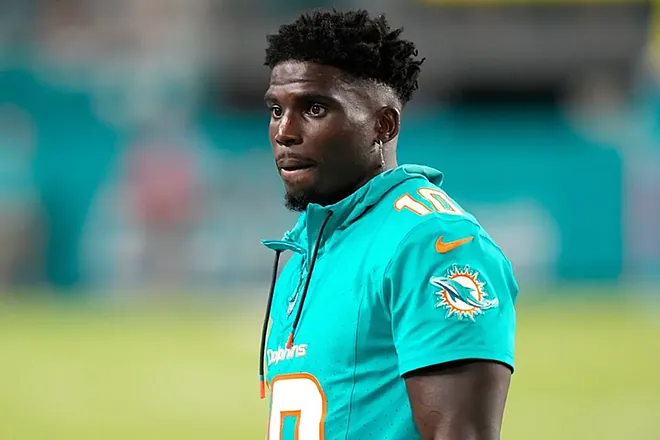When the Miami Dolphins acquired Tyreek Hill in a blockbuster trade with the Kansas City Chiefs in March 2022, the franchise knew they were getting a game-changing superstar. Hill, known for his blazing speed and big-play ability, instantly elevated the Dolphins’ offense and gave quarterback Tua Tagovailoa a dynamic weapon. In the two years since the trade, Hill has delivered on the field—and then some—proving he’s still one of the NFL’s elite wide receivers.
But as the Dolphins navigate the complex waters of roster building and salary cap management, a difficult question has begun to surface: Would Tyreek Hill be willing to accept a lower salary in order to remain in Miami long-term?
It’s a query that mixes loyalty, legacy, and the realities of professional football’s economics. At 30 years old, Hill remains in his athletic prime but understands the window for maximizing his career earnings is closing. At the same time, his fit in Miami’s offense, his rapport with teammates, and the South Florida lifestyle all suggest he’s happy with his current situation. Whether that happiness translates into financial flexibility for the organization, however, remains uncertain.
Tyreek Hill’s Contract Landscape
Tyreek Hill signed a four-year, $120 million contract extension with the Dolphins at the time of the trade in 2022, making him the highest-paid wide receiver in NFL history by average annual value. The deal included $72.2 million in guarantees and a $25.5 million signing bonus. While the headline numbers were eye-popping, the contract was structured in a way that allowed the Dolphins some early flexibility.
Fast forward to 2025, and Hill is slated to carry a cap hit of over $31 million. That figure ranks near the top among NFL receivers, and with several players on the roster—including Tua Tagovailoa and Jaylen Waddle—expected to receive substantial new deals, the Dolphins are approaching a financial crossroads.
General Manager Chris Grier has shown a willingness to be aggressive, but the Dolphins’ cap situation is getting tighter. The team restructured multiple contracts to create cap room in recent years, and those “credit card” moves are now coming due. For Miami to stay competitive while retaining its core, sacrifices might be necessary—including from Hill himself.
Hill’s On-Field Value: Still Worth the Price?
There’s no doubt about Tyreek Hill’s value on the field. In 2023, he posted 119 receptions for 1,799 yards and 13 touchdowns, finishing second in the league in receiving yards and further solidifying his All-Pro credentials. His presence forces defenses to account for him on every snap, often opening up opportunities for teammates.
More than just a speedster, Hill has evolved into a complete receiver, with improved route-running, hands, and leadership. He’s been instrumental in Miami’s offensive evolution under head coach Mike McDaniel, a mastermind who has built schemes that maximize Hill’s unique abilities.
But even as Hill continues to play at an elite level, wide receiver salaries around the league are trending upward. Justin Jefferson, CeeDee Lamb, and Ja’Marr Chase are all in line for megadeals that could reset the market again. That leaves the Dolphins with a dilemma: keep paying Hill top dollar into his 30s, or explore ways to reduce his cap hit.
Could a Pay Cut Actually Happen?
Historically, it’s rare for star players—especially those still producing at an elite level—to voluntarily take pay cuts. However, there are notable exceptions. Tom Brady repeatedly restructured his deals to help the New England Patriots remain competitive. Larry Fitzgerald, another high-character leader, adjusted his salary late in his career to remain in Arizona.
So, would Tyreek Hill follow in those footsteps?
The answer may lie in what Hill prioritizes most. If winning a Super Bowl, building a legacy in Miami, and cementing his Hall of Fame case are more important than maximizing earnings, a pay cut or restructuring could be possible. Additionally, Hill has earned over $100 million in his career already and has secured numerous off-the-field endorsements and business ventures, including his podcast and clothing line.
Still, Hill has shown strong self-belief and confidence in his value. In interviews, he’s been candid about knowing his worth. He’s also voiced a desire to retire early—hinting at a potential departure from the NFL by the age of 32 or 33, which complicates the situation further. A short-term extension with a lower annual salary but more guaranteed money might be a way to bridge the gap.
The Dolphins’ Financial Puzzle
Beyond Hill, the Dolphins have significant financial commitments looming. Quarterback Tua Tagovailoa is entering the final year of his rookie deal, and given his progression and importance to the team, he’s likely to command a deal in the range of $45–55 million annually.
Then there’s Jaylen Waddle, who will be eligible for an extension soon and has blossomed into one of the league’s top No. 2 receivers—one who could easily be a WR1 elsewhere. Defensive tackle Christian Wilkins and safety Jevon Holland are also due for new deals, and the team just committed long-term money to left tackle Terron Armstead and cornerback Jalen Ramsey.
Simply put, if the Dolphins want to retain their current core and make a serious Super Bowl run, something has to give.
Hill’s cap number is one of the most logical targets for flexibility. That doesn’t necessarily mean a pay cut; restructuring into a longer deal with void years, converting base salary into bonus money, or adding incentives tied to performance and playoff success are all options.
Tyreek’s Relationship with the Dolphins
From all accounts, Tyreek Hill is happy in Miami. He has embraced the city’s culture, fans, and weather. His social media presence is full of Dolphins-related content, and he’s shown love to teammates and coaches consistently. Off the field, he’s become a fixture in South Florida—hosting charity events, youth camps, and community appearances.
That connection shouldn’t be overlooked. Players who feel appreciated and integrated into a franchise’s long-term vision are more likely to show flexibility. The Dolphins’ organization has embraced Hill not only as a player but as a brand—something Kansas City reportedly struggled with near the end of his tenure there.
If the Dolphins present the idea of a restructured deal as a path to keep the team’s Super Bowl window open while protecting Hill’s status and legacy, he might be more open to the conversation.
The Legacy Factor
Tyreek Hill is already a Super Bowl champion, having won a ring with the Chiefs. But winning one with the Dolphins—who haven’t hoisted the Lombardi Trophy since the 1973 season—would be a defining moment for both him and the franchise. It would elevate his status from dynamic playmaker to franchise legend.
That kind of legacy can’t be bought.
If Hill sees the writing on the wall and believes that making a financial sacrifice could be the difference between a deep playoff run and an early exit, he may consider taking a slightly smaller salary—or at least restructuring it to allow for more team flexibility.
NFL history is filled with players who chased every dollar but never won a ring. It’s also filled with those who sacrificed to win—and were remembered forever.



